In a move likely to create further animosity between Kyiv and Moscow, on Tuesday (18 October), the Ukrainian parliament, known as the Verkhovna Rada, recognised the independence of the Chechen Republic of Ichkeria, declaring it 'temporarily occupied by Russia'. The Rada also condemned the 'commission of genocide against the Chechen people'.
The resolution reads: ‘We declare the recognition of the Chechen Republic of Ichkeria as temporarily occupied by the Russian Federation as a result of armed aggression committed in violation of the UN Charter’.
The Ukrainian parliament also called on UN member states and international organisations to carry out an independent and impartial investigation into purported crimes committed in Chechnya over the last three decades, to 'ensure that the guilty are brought to justice'.
The head of the Rada's For a Free Caucasus Committee, Oleksiy Goncharenko, praised the decision, saying: 'I think this is an extremely important decision. Putin has been trying to enslave the Chechen people for a very long time, he appointed his gauleiter Kadyrov to manage, and now he forces the Chechens to fight against the Ukrainians. This is a typical imperialist policy of Russia in relation to other peoples.'
Out of 351 members present, 287 voted for, and 0 voted against or abstained. The remaining 64 did not vote.
Chechens have been playing a prominent role in the fighting in Ukrainian, with groups supporting either the Ukrainian government or Moscow.






